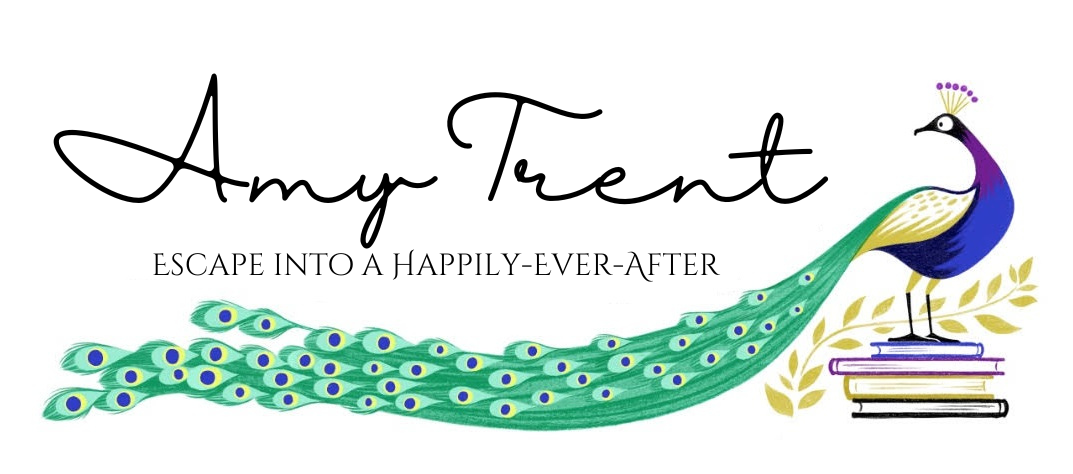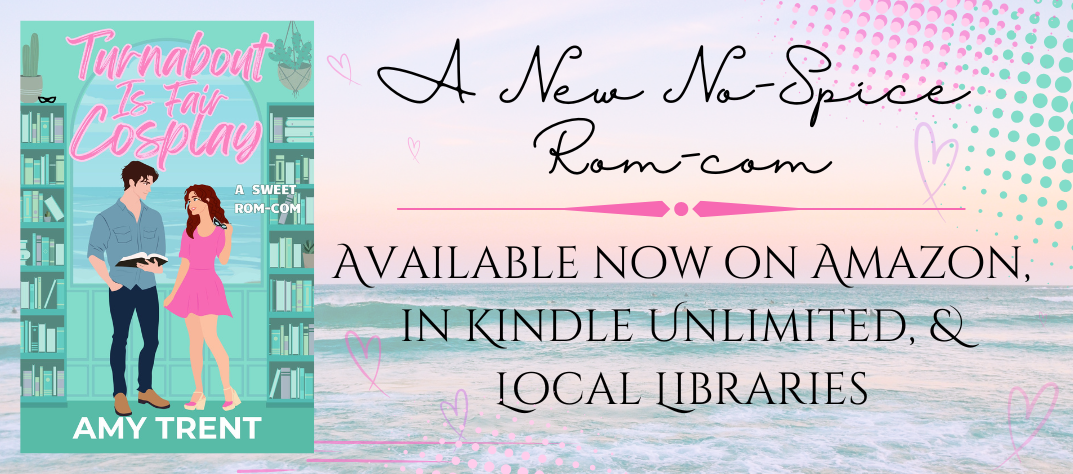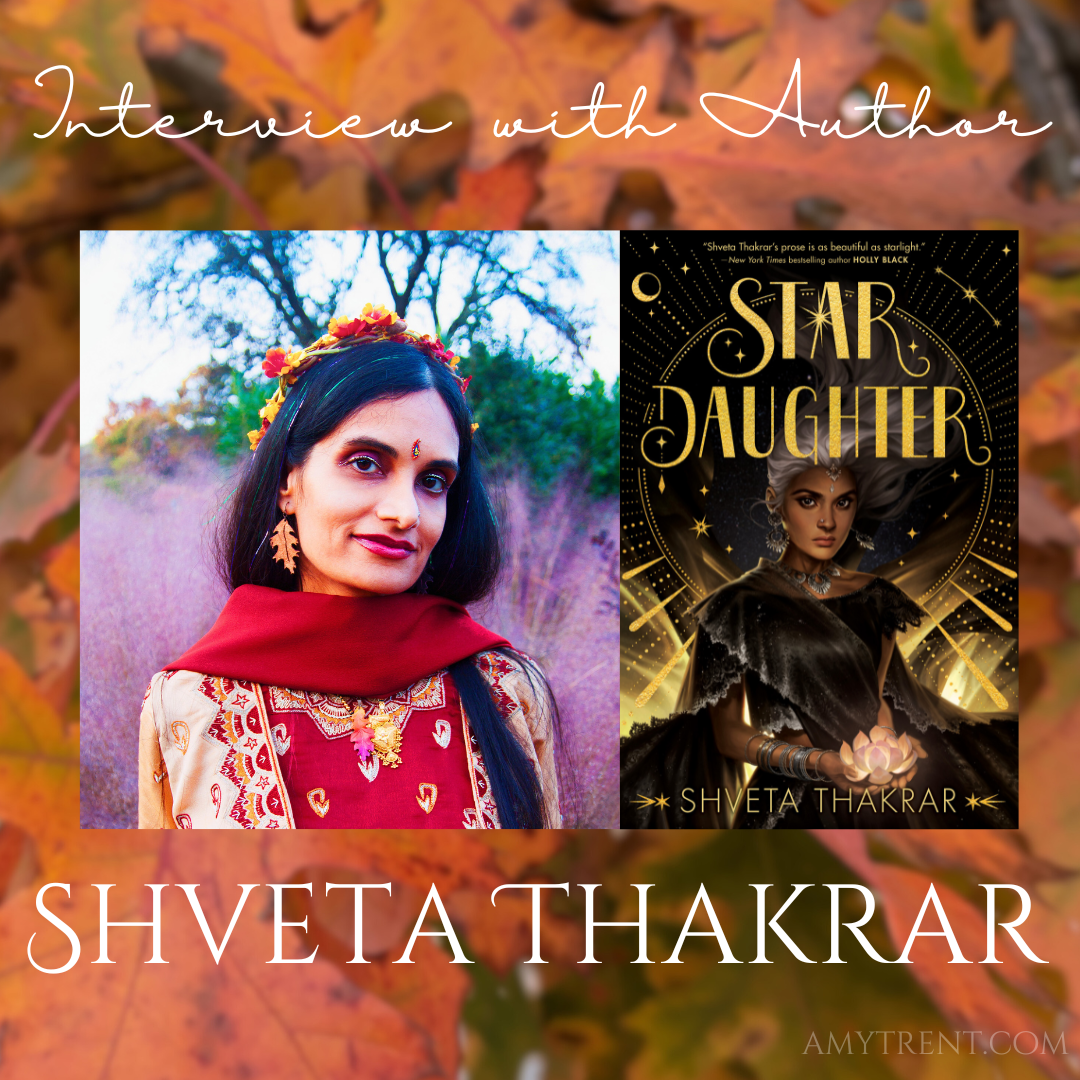(I met Shveta Thakrar earlier this year and was so inspired by her love of folklore, fairy tales, and mythology. I was lucky enough to be at a reading of her forthcoming fantasy novel, Divining the Leaves, and was blown away by the magic and beauty of her prose. Reading her books is like diving headfirst into enchantment with the rush of young adulthood flooding your senses. Star Daughter was one of my favorite summer reads this year. I hope you enjoy our chat below!)
Amy: Shveta, welcome, and thank you for joining me today to talk a little bit more about your gorgeous novel, Star Daughter. You ready to get started?
Shveta: Yes! Thank you so much for your kind words! It sounds like you are my ideal reader, which makes me so happy. There’s nothing better than hearing that my work not only landed but also resonated.
Amy: Early in your novel Radhikafoi says to your heroine, Sheetal, “You tell me—what good have fairy tales ever done any of us?” I loved how this question highlights who Sheetal’s auntie is as a character, but I also loved exploring my answer to this question. I know fairy tales have done me a lot of good—leading to connection, compassion, reflection, and understanding. But I wanted to ask you what good have fairy tales done for you?
Shveta: I grew up reading fairy tales around the world. They definitely shaped my ideas about story; how could they not? And that includes a desire never to settle and always seeking better than we have.
A close friend recently said this when we were discussing the power—or lack thereof—stories have: Rather than being a cure, stories are medicine. I agree. All stories, including fairy tales, can offer us other, better ways to think and be—if we are willing to look at ourselves and the world around us and ask how we can improve both. The actual work is still ours to do. Magic always has a price, after all!
The disconnect happens when we get the cathartic feelings of righteousness or justice being served or even simple anger from reading a story but stop there. Those feelings are meant to be the impetus to start our journey of self-improvement, not to substitute for it. So for me, fairy tales are a reminder always to look within and question my assumptions and always push myself in favor of kindness with boundaries while interacting with the world. That, for me, is the root of any social justice I fight for: When I show up as the best, most self-aware and grounded version of myself, I put light into the world with everything I do and maybe even inspire others to do the same.

Amy: There is a gorgeous, tragic story in chapter four—the story of the artist who falls in love with a star—that felt like folklore. It was fascinating, compelling, and foundational to some of the main conflicts in Star Daughter. What were your inspirations and did any folklore inspire or influence this story within a story?
Shveta: Saying it felt like folklore is the best compliment you could have given me! Thank you so much. (I took inspiration from this story from the Mahabharata in particular: Urvashi and Pururavas, a version of the ATU supernatural bride tale type.)
As someone who has spent her life chasing the numinous, I think a lot about impossible relationships and yearning for something more, particularly in the form of a folkloric being, and how that would actually work in practice. Power dynamics exist in all relationships, some healthy, some very much not, and the inherent differences between a human with all our foibles and inevitable decline and a functionally immortal, mystical creature might in some cases be insurmountable. Or at least sour the relationship after the honeymoon period wore off and real-life problems like aging and dealing with taxes and cleaning the disgusting bathroom set in. (Not to say a mythical being wouldn’t have their own problems, but they’d be on a different scale.) But what happens after you’ve touched magic and enjoyed what it, ever so briefly, brought you? Can you truly go back to mundane life? I know I would feel bereft.
That said, the artist in question also did not have to make the choice he did! Greed is never an excuse, no matter one’s species, and he could have tried being grateful for the gifts he’d been given without demanding more. (*sidelong glance at our world’s billionaire class*)
Amy: Okay, follow-up question that may or may not relate. Many times when writers explore folklore, they set their stories in the past: long ago, faraway, once upon a time. Your story is set in the present. Why did you want to explore this story through a modern lens?
Shveta: Three reasons: One, I was deeply inspired by Holly Black’s first books (her Modern Faerie Tales trilogy) in my mid twenties. They’re contemporary fantasies featuring fairylore set in New Jersey and New York, places I know well, and I adored the idea that if I just angled my peripheral vision the right way, I, too, might glimpse mythical beings.
Two, I had never seen Hindu/desi characters in the fantasy I loved to read, and I decided I would do my part to help with that representation by setting it in the here and now, as if my own teen self might have gone on those adventures.
Three, the phrase “once upon a time,” while conjuring romantic and ethereal, even nostalgic, notes, is also essentially a reference to the past, shutting the door on what might be. But readers need to see that these characters and their mythology belong to the actual, living present with all its possibilities, too.

Amy: “The song was the silver of starlight, of wind chimes and ringing bells and stories braided with skeins of myth and dreams and wishes.” Your prose is beautiful, and the quote above is just one of the many I highlighted when I was reading this book. What is your relationship to poetry and how has it influenced your prose?
Shveta: I actually do occasionally write speculative poetry! But what really got me was when I found writers like Laini Taylor and Catherynne Valente and swooned over their prose. I felt like I’d been hit by the muse of realization, and my first thought was, You can do that??? Mind. Blown!
Once I recovered, my second thought was that my voice could be like that, too, once I had worked to cultivate it. I want to immerse the reader in the intricate worlds that live within my mind, and the best way for me to do that is by painting with words like a visual artist paints with pigment.
Amy: There are lots of fun themes to explore in Star Daughter about inspiration and creativity. As a creator, it is so tempting to think, “Oh, if only I could bottle up this inspiration and scarf it down later.” Our sources of dietary nourishment need to be pretty close to continuous, and the more I write, the more I realize my sources of inspiration need to be too. When it comes to your art and writing, where do you replenish your wells of creativity? Where do you source your inspiration? Is it a steady diet or a feast/famine cycle?
Shveta: Oh, I love talking about inspiration! I joke that I have a sparkly purple cauldron at the back of my head, constantly simmering away, and everything I take in, whether media (books, movies, TV shows, video games, music) or experiences (travel, shopping at little boutiques with strange and beautiful things for sale, cooking and baking, immersive theater, dressing up in my Indian faerie aesthetic with friends, rambles in nature, creative hobbies unrelated to writing) goes right in, ingredients to be combined into a great potion that only makes itself known to me later in fits and starts. I’m also aiming to add fun writing prompts to the mix, done by hand and in fountain pen.
That said, muses are fickle at best, and the cauldron can easily dry up and burn out, so I’m trying to take care to find the balance of writing and getting through life’s challenges while remembering to feed my imagination as regularly as I can. I’m aiming for a steady diet, but that doesn’t always happen. Who knows; maybe the bouts of frustration and exhaustion and even self-doubt are necessary fuel for the creative flame that heats the cauldron!

Amy: Are all artists self conscious about their art? Sheetal’s art is her song, but she doesn’t want Dev or really anyone to hear her sing for much of the book. At one point Sheetal is reading about other half-stars and you write, “This, reading that there had been other half-stars, made her feel like she was part of something. It meant she wasn’t an anomaly, an accidental one-off, and that for the first time she fit somewhere.” Do artists have to share their art, in spite of their self consciousness, to belong?
Shveta: I suppose there must be artists among us who really do make something and then put it away in a drawer, but I believe most of us feel moved to be part of the greater conversation. What makes it so nerve-wracking, though, is that being vulnerable means you’re offering a part of yourself up for criticism and ridicule or even indifference as much as for praise and understanding. Ask me how I know!
But even understanding that I can’t control the reception my work gets, no matter how much of myself I put into it, I would still never write without at least trying to share my words and wake wonder in others. Otherwise, why not just daydream and leave it at that?
Amy: I was captivated by the Night Market and so excited to learn that it shows up in your other novels. Minal at one point says to a vendor at the market, “Just take my money”, and this was exactly how I felt. I want two of everything; take my money; please and thank you. I was particularly enamored with the, “Diamond-eyed onyx spiders that perched in customers’ hair, weaving elaborate cobweb headdresses.” I’m certain I’d never have another bad hair day again if I could bring one of those spiders home. What would you buy at the Night Market?
Shveta: This will sound like a cop-out answer, but honestly, I wrote the Night Market first and foremost for my dreamer self, who longs desperately for a chance to shop at such a place. So every ware I included (and those I was forced to cut for the sake of pacing and plot) is something I would want! I would probably be in grave danger if I did get to go, because I’d end up trading away lots of valuable things in exchange for all kinds of frivolous whimsies—but I’m not sure I’d be sorry. 😉
And because one book wasn’t enough, I had to return to the Night Market twice more. It was fun to find new reasons for why the characters would visit it—as well as devise new goodies for sale!
Amy: I’m a hopeless romantic. I happy-danced when I learned there was a short story about how Sheetal’s parents met. It’s over at Enchanted Living, and is a super fun introduction to your writing, worldbuilding, and storytelling. Okay, so I need to know what Sheetal’s parents said to each other when they were reunited at the end of Star Daughter? Tell us more about their HEA.
Shveta: I am, when the story is done well, also a hopeless romantic! So your delight in Sheetal’s parents’ courtship makes my day.
What did they say to each other when they were reunited? They admitted to each other that they will always be happier together than apart, even if their particular circumstances are challenging—see my answer to question two. They know they only have the rest of his mortal lifetime together, during which he’ll age much, much faster than she does, not to mention that she’ll have to go back to the heavens every so often to satisfy the celestial pull on her, but even with all that working against them, they’ll make the most of what they were given.

Amy: Dev won my heart when he baked Sheetal chocolate chip cookies in chapter four. Cookies are definitely the way to my heart both on and off the page. Do you have a favorite type of cookie? Or is there a different type of food that holds the key to your heart?
Shveta: I do love me a good double chocolate-chip cookie—the softer and the more laden with chips, the better! But I also love other sweets, too, including the various kinds of mithai Sheetal enjoys in the novel. And to be fair, I love savory and spicy things, too, so anyone cooking or baking for me would instantly melt my heart. Really, I love food in general, as long as it has flavor. (Just hold the meat, please; I’m a vegetarian.)
Amy: Music is a big, beautiful part of Star Daughter. Are there artists IRL that capture Sheetal’s essence? Do you have a playlist of songs that were part of your creative process for this book?
Shveta: Yes, and yes! I also love music and often have it on in the background for ambience. Its ability to evoke mood is amazing, and I definitely had a rotation in play when working on Star Daughter. I called it my Lisa and Lata list, because it heavily featured Dead Can Dance (of which Lisa Gerrard is one half) and Lata Mangeshkar, the now-passed playback singer known as the Queen of Bollywood. Combine their gorgeous individual voices and styles, and you get Sheetal.
To inspire Dev’s singing, I listened to a lot of Kishore Kumar, also of golden-age Bollywood fame. That voice! So dreamy.
Finally, to round things out, I sprinkled in some Faun and Loreena McKennitt. All highly recommended!
Amy: Shveta, this has been so fun! Where can readers find you and learn more about your novels?
Shveta: Please stop by for a cup of virtual masala chai and sign up for my very occasional newsletter at my online home: www.shvetathakrar.com. You can also catch up with my adventures on Instagram at @shvetathakrar and occasionally on Twitter, also at @shvetathakrar.
Thanks so much for having me, Amy! These were such lovely, thoughtful questions, and I loved returning to Sheetal’s world to ponder them.

Amy: Thank you, Shveta! Links to all of Shveta’s books below.


